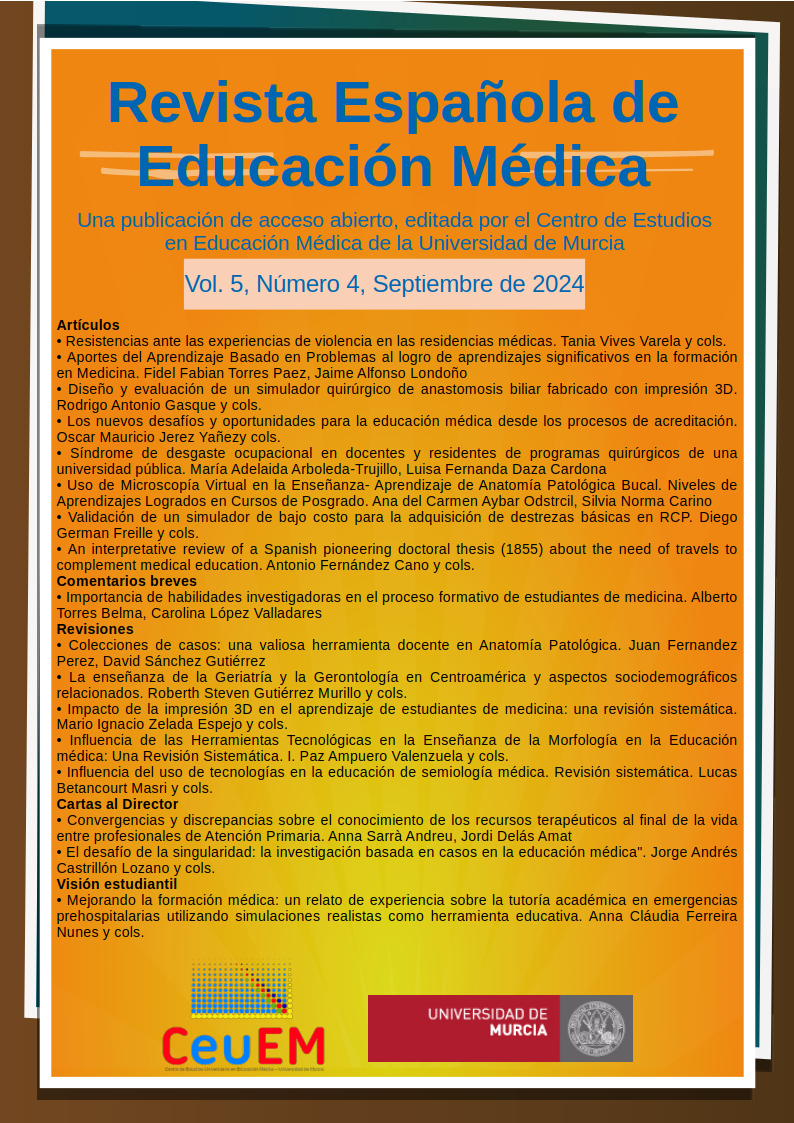Development and validation of a low-cost simulator for basic CPR skills acquisition
Abstract
Cardiopulmonary resuscitation, also known as CPR, is a procedure designed to revive people who have stopped breathing or whose heart has stopped beating. The American Society of Cardiology (AHA) recommends using audiovisual feedback devices during CPR for real-time optimization of the effectiveness of the maneuvers.
A project led by engineering faculty and students was created due to the high cost and lack of local availability of feedback devices. The objective was to develop an affordable electromechanical simulator, evaluated by experts and end users, to train future doctors and the general public in CPR who need skills for the management of cardiac arrest.
After building the initial prototype, supervised testing was performed to ensure its compatibility with the anatomy and strength of an average human thorax. Corrections and adaptations were made until the expected parameters for CPR training were met according to international standards. Then, a randomized study was carried out with health sciences students who had previous experience in CPR. They were divided into two groups and were asked to perform CPR maneuvers for 2 minutes, with assignment of random numbers independent of their participation group.
Finally, both groups will randomly perform 2 minutes in a commercial CPR simulator with feedback. These were monitored by a blind observer who does not know which group each student belongs to and will complete a form where the correct placement of the hands, the frequency of the average compressions and their depth were recorded.
The analysis of results shows that the group that used the simulator with real-time feedback had a higher percentage of correct CPR maneuvers compared to the control group. This suggests that our prototype met its objectives by allowing faster and more accurate learning of CPR techniques.
Downloads
-
Abstract655
-
pdf (Español (España))455
-
pdf455
References
American Heart Association website. Highlights of the 2020 American Heart Association Guidelines for CPR and ECC. Disponible en: https://cpr.heart.org/-/media/cpr-files/cpr-guidelines-files/highlights/hghlghts_2020_ecc_guidelines_english.pdf
Duff JP, Topjian A, Berg MD, et al. 2019 American Heart Association focused update on pediatric advanced life support: an update to the American Heart Association guidelines for cardiopulmonary resuscitation and emergency cardiovascular care. Circulation. 2019;140(24):e904-e914. PMID: 31722551 https://pubmed.ncbi.nlm.nih.gov/31722551/
Perkins GD, Graesner JT, Semeraro F, Olasveengen T, Soar J, Lott C, Van de Voorde P, Madar J, Zideman D, Mentzelopoulos S, Bossaert L, Greif R, Monsieurs K, Svavarsdóttir H, Nolan JP; European Resuscitation Council Guideline Collaborators. European Resuscitation Council Guidelines 2021: Executive summary. Resuscitation. 2021 Apr;161:1-60. doi: 10.1016/j.resuscitation.2021.02.003. Epub 2021 Mar 24. Erratum in: Resuscitation. 2021 May 4;163:97-98. PMID: 33773824. https://doi.org/10.1016/j.resuscitation.2021.02.003
Panchal AR, Berg KM, Hirsch KG, Kudenchuk PJ, Del Rios M, Cabañas JG, Link MS, Kurz MC, Chan PS, Morley PT, Hazinski MF, Donnino MW. 2019 American Heart Association Focused Update on Advanced Cardiovascular Life Support: Use of Advanced Airways, Vasopressors, and Extracorporeal Cardiopulmonary Resuscitation During Cardiac Arrest: An Update to the American Heart Association Guidelines for Cardiopulmonary Resuscitation and Emergency Cardiovascular Care. Circulation. 2019 Dec 10;140(24):e881-e894.. Epub 2019 Nov 14. PMID: 31722552. https://doi.org/10.1161/cir.0000000000000732
Alonso CG, Natalia L, García F, Cortes M. . Desarrollo de un simulador de bajo costo para la adquisición de destrezas básicas en cirugía artroscópica. Revista de la Asociación Argentina de Ortopedia y Traumatología. 2014. 79. 107. 10.15417/339.
Cozzi JP, Mondino SA. Simulador Biomédico UCC. Trabajo Final de Grado de la Facultad de Ingeniería de la Universidad Católica de Córdoba. Mayo 2023.
Gaba DM. The future vision of simulation in health care. Qual Saf Health Care. 2004 Oct;13 (Suppl 1):i2-10. https://doi.org/10.1136/qhc.13.suppl_1.i2
Berger C, Brinkrolf P, Ertmer C, Becker J, Friederichs H, Wenk M, et al. Combination of problem-based learning with high-fidelity simulation in CPR training improves short and long-term CPR skills: a randomised single blinded trial. BMC Med Educ. 2019;19(1):1-10. https://doi.org/10.1186/s12909-019-1626-7
Proyectoaprendemergencias.es Puedes salvar una vida. [citado 07 agosto 2024]. Disponible en: https://www.aprendemergencias.es/salud-y-primeros-auxilios/rcp-b%C3%A1sica-en-adulto/
CAE Ares [citado 07 agosto 2024]. Disponible en: https://delec.com.ar/es/simulacion_medica/ares/
Copyright (c) 2024 Servicio de Publicaciones de la Universidad de Murcia

This work is licensed under a Creative Commons Attribution-NonCommercial-NoDerivatives 4.0 International License.
The works published in this magazine are subject to the following terms:
1. The Publications Service of the University of Murcia (the publisher) preserves the economic rights (copyright) of the published works and favors and allows them to be reused under the use license indicated in point 2.
2. The works are published under a Creative Commons Attribution-NonCommercial-NoDerivative 4.0 license.
3. Self-archiving conditions. Authors are allowed and encouraged to disseminate electronically the pre-print versions (version before being evaluated and sent to the journal) and / or post-print (version evaluated and accepted for publication) of their works before publication , since it favors its circulation and earlier diffusion and with it a possible increase in its citation and reach among the academic community.



















